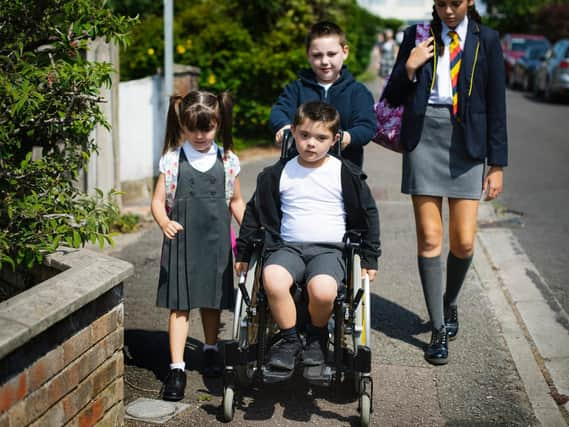Special educational needs children "forced out of mainstream education" across Leeds


The number of children with special educational needs (SEN) in mainstream education has fallen in Leeds since 2012, while the number attending special schools has risen by more than half, analysis by JPIMedia shows.
In 2012, the proportion of children with SEN in the city's primary and secondary schools was 18 per cent, according to the latest Government statistics.
But as of 2019, this had fallen to 14 per cent.
Advertisement
Hide AdAdvertisement
Hide AdAnd the number of children attending special schools has risen in Leeds by 67 per cent, the Department for Education (DfE) figures reveal.
This is despite the introduction of the Children and Families Act 2014, which states that children with SEN should usually be given a place in mainstream classes.
The Government said all schools should be inclusive.
Councillor Jonathan Pryor, executive member for learning, skills and employment at Leeds City Council said: “We take the educational needs of all children extremely seriously and seek to provide the most appropriate schooling possible, but this is the latest example of how ideological Government cuts have detrimentally affected children with special educational needs and disabilities. Schools are at breaking point and the Government must wake up.”
The proportion of mainstream primary school pupils who have special needs in Leeds is now 15 per cent. This is a fall from 17 in 2012.
Advertisement
Hide AdAdvertisement
Hide AdIntegration of SEN pupils is even worse in secondary schools in the city. The proportion of mainstream secondary school pupils who have special needs is now 11 per cent. This is a fall from 19 per cent in 2012.
The Alliance for Inclusive Education (ALLFIE) has accused the Government of an “on-going attack on disabled people’s rights to be included rather than segregated from society”.
Simone Aspis, policy and campaigns coordinator at ALLFIE, said: “Parental choice is a myth – parents we know do not choose special school provision, they are forced into it because mainstream schools no longer have the money and support to implement inclusive education practice.”
She said the Government was dealing with a shortfall in SEN places by planning new special schools rather than funding better provision in mainstream education.
Advertisement
Hide AdAdvertisement
Hide AdShe added: “This is no longer about austerity, but rather this Government’s on-going attack on disabled people’s rights to be included rather than segregated from society.”
Nationally, the number of children with SEN in mainstream education in England has dropped by a quarter - 24 per cent - since 2012, while the number attending special schools has increased by nearly a third - 31 per cent.
A spokesperson for the DfE said: “All schools must be inclusive of children with disabilities and 82 per cent of all pupils identified as having special educational needs are in state-funded mainstream schools.
“Additionally, we have created new special schools in response to the increasing number of pupils with complex special educational needs and are committed to delivering even more provision to ensure every child is able to access the education that they need.”
Advertisement
Hide AdAdvertisement
Hide AdMainstream schools in England are now the least inclusive in the UK, the analysis by the JPIMedia data unit shows.
Now, only about one in seven children in mainstream primaries and one in eight children in mainstream secondaries have special needs.